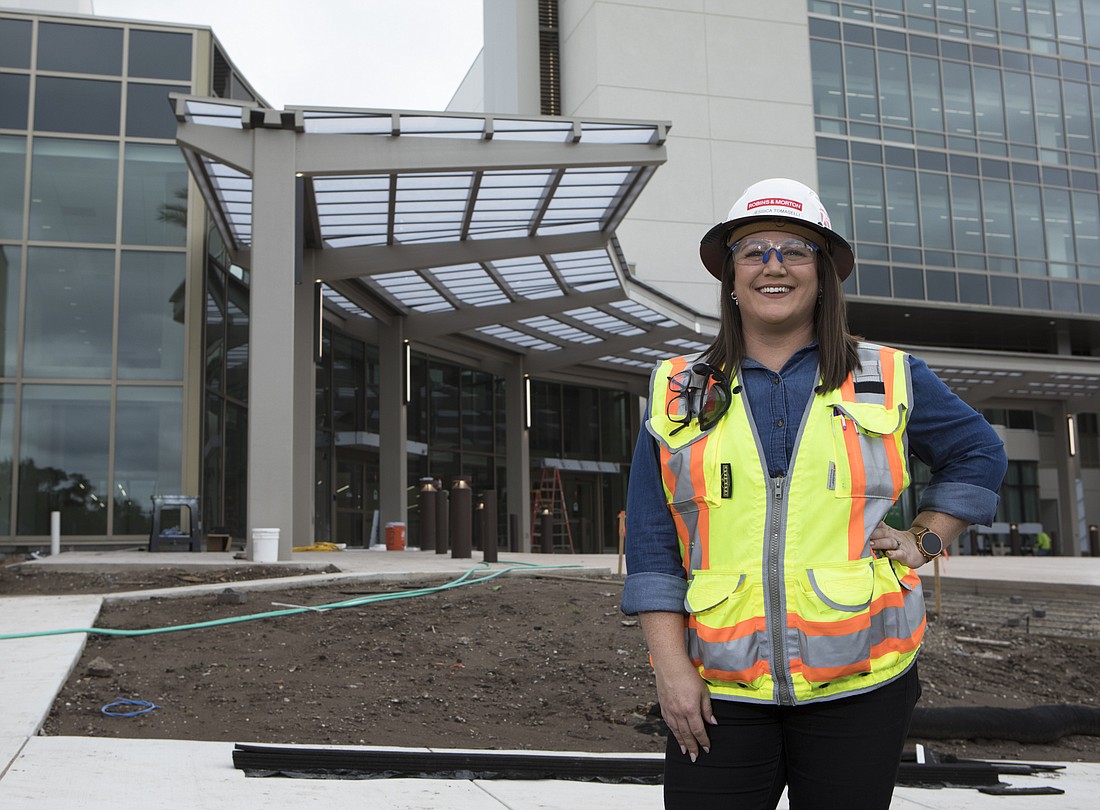- January 11, 2025
-
-
Loading

Loading

March is always a big month for women. Women’s History Month is recognized by the United States, United Kingdom and Australia, and International Women’s Day, which falls on March 8, has been celebrated worldwide since 1911.
Not as well known, but increasingly important to economic growth at both micro and macro levels, is Women in Construction Week, which has been observed since 1998, when it was created by the National Association of Women in Construction (NAWIC). This year, it took place from March 6 to 12.
With an ongoing labor shortage in construction and trades, there’s never been a better time for women to join the field, yet only 10% of people working in construction are female. To help highlight the need for more women in construction, the Business Observer spoke with Jessica Tomaselli of Robins & Morton, a Birmingham, Ala.-based general contractor that has a significant presence in Orlando and Tampa Bay.
The 34-year-old Tomaselli has already risen to the rank of senior project manager and is shepherding the $152 million renovation and expansion of St. Anthony’s Hospital in St. Petersburg, a project that’s set to wrap up next month. Lightly edited excerpts of our conversation with her follow.
Q: You studied interior design in college. Why didn’t you pursue that career path?
‘The industry as a whole is making huge strides to be more inclusive and make sure that they're recruiting women as they come out of college now, but we need more women are participating in the trades themselves.’ Jessica Tomaselli, senior project manager at Robins & Morton
A: I'm your typical millennial market crash victim. Basically, right before I was about to graduate [from the University of Florida], there was a hiring freeze. Interior design at UF is a fairly small program. There were about 30 people in our graduating class in 2009, but nobody could get a job. I think one person ended up with a job right out of college.
Q: What drew you to the construction industry?
A: At UF, the College of Design, Construction and Planning, which has interior design, is right across the street, literally, from the School of Construction Management. So I was like, ‘Well, heck, if nobody is able to get a job right out of college, I'll make myself a more marketable designer,’ and so I got a master’s in construction management. I ended up finding out that construction is actually the place that I wanted to be. There's so much more upward movement in construction, and so many more opportunities. It ended up being a no-brainer.
Q: The number of women in construction is growing, but still lags well behind other sectors of the economy. What can the construction industry do better to appeal to women?
A: The industry as a whole is making huge strides to be more inclusive and make sure that they're recruiting women as they come out of college now, but we need more women are participating in the trades themselves. We have an aging population of tradesmen, and there's not as many people coming up through the trades as we would like. What will construction look like in 10 years if there's nobody coming up behind these tradespeople? I think women in the trades would be an excellent maneuver for the construction industry to focus on.
Q: Nearly a decade into your career in construction, do you still face challenges related to your gender?
A: I wouldn’t say there are none, but the industry has definitely shifted. The St. Anthony’s project, in particular, has the most women I've ever worked with in positions of leadership. Our structural engineer is a woman; our civil engineer is a woman; the managing partner for the architecture firm that we're working with is a woman, and there are several trade contractors that have women in leadership positions.
Q: What are you doing, personally, to encourage more women to consider careers in construction?
A: We had a nice young lady from Auburn University join us as an intern [on the St. Anthony’s project], which I was over the moon about. We had a chance to spend a lot of time together on the job site … more than I would have with any of the other interns, so I could make sure she she felt comfortable enough to continue to pursue a career in construction. I was like, “Bring your friends!” Also, Tampa has a small chapter of NAWIC, and we're inviting women to come join us for monthly meetings, social events and networking events.